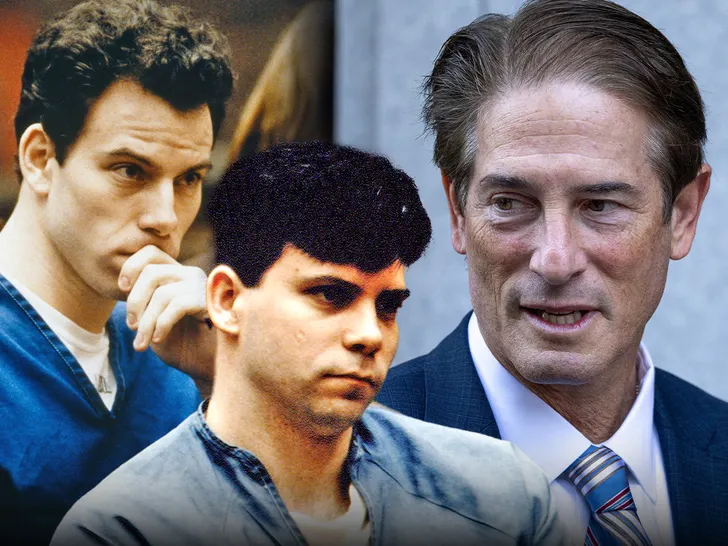Menendez Family vs. LA District Attorney Nathan Hochman: The Battle Over Abuse Claims and a New Trial
The legal saga surrounding Erik and Lyle Menendez, infamous for the 1989 murders of their parents, has taken a dramatic turn. The Menendez family is now publicly clashing with Los Angeles County District Attorney Nathan Hochman over his controversial dismissal of new evidence that could change the course of the brothers’ case.
Anamaria Baralt, cousin to Erik and Lyle and niece of the late Jose Menendez, has spoken out, calling Hochman’s comments on the case “abhorrent” and accusing the DA of silencing survivors of sexual abuse. Baralt, who has been a key figure in the brothers’ defense and support, condemned the DA’s position during a statement to TMZ, emphasizing the severe psychological impact abuse has on victims.
The Battle for Justice: Hochman Dismisses New Evidence
In a heated press conference held last Friday, Hochman asserted that the Menendez brothers should not be granted a new trial, despite their claims that they were victims of sexual abuse at the hands of their father, Jose. The brothers’ legal team presented new evidence, including a letter Erik allegedly wrote to Baralt in 1988, where he details the sexual abuse he suffered. In addition, a statement from a former Menudo member surfaced, claiming that Jose Menendez had sexually abused him in the 1980s.
However, Hochman dismissed this new evidence, stating that the sexual abuse allegations were irrelevant to the murder case. He stated that the abuse did not change the fact that Erik and Lyle were convicted of murdering their parents. His stance has sparked outrage from the Menendez family, who believe that Hochman’s refusal to consider the abuse claims undermines the trauma the brothers endured.
Anamaria Baralt’s Fierce Response
Baralt was quick to respond, expressing her disbelief and anger over the DA’s comments. “To suggest that the years of abuse couldn’t have led to the tragedy in 1989 is not only outrageous, but also dangerous,” she said. “Abuse does not exist in a vacuum. It leaves lasting scars, rewires the brain, and traps victims in cycles of fear and trauma.”
She went on to argue that Hochman’s stance is not only dismissing the brothers’ experiences but also retraumatizing abuse survivors everywhere. “He is silencing survivors who have faced similar challenges—who know all too well what it feels like to be disbelieved and ignored by a system designed to protect them,” she added.
Baralt’s comments are a powerful reminder of the emotional and psychological toll that long-term abuse can have on an individual, especially when they are forced to relive it through the legal system.
The Importance of the New Evidence
The new evidence presented by Erik and Lyle’s legal team is seen as potentially groundbreaking. The letter Erik sent to his cousin in 1988, believed to be written before the murders, includes his firsthand account of the sexual abuse he allegedly endured. This letter has been described as a key piece of evidence that could corroborate the brothers’ claims of long-standing trauma.
Additionally, the letter from the Menudo member, who claimed that Jose Menendez sexually assaulted him during the 1980s, adds further weight to the argument that the brothers’ actions were a direct result of years of abuse. The family believes this new evidence should be taken seriously, as it paints a clearer picture of the horrific conditions that Erik and Lyle were subjected to growing up.
A History of Trauma and Tragedy
The Menendez brothers’ case has long been a topic of public fascination and legal debate. In 1989, Erik and Lyle were convicted of murdering their parents, Jose and Mary Louise Menendez, in their Beverly Hills mansion. The brothers claimed that the killings were a desperate attempt to stop their father’s years of sexual and physical abuse.
However, their defense was met with skepticism, and the brothers were ultimately convicted and sentenced to life in prison without the possibility of parole. The case was a media sensation, and the Menendez brothers became infamous for their emotional trial and the shocking nature of the crime.
For years, the brothers’ legal team has pushed for a new trial, arguing that the abuse they endured was a mitigating factor in the killings. Despite their efforts, the legal system has yet to fully acknowledge the depth of their claims.
The Menendez Family’s Continued Fight for Justice
Baralt and the Menendez family are not backing down. They argue that the new evidence cannot be ignored and that the brothers’ actions were directly influenced by the trauma they endured. For them, this case is not just about seeking justice for Erik and Lyle, but also about standing up for all survivors of abuse who continue to be dismissed and silenced by the system.
In an interview on the “2 Angry Men” podcast, co-hosted by the brothers’ attorney Mark Geragos, Erik and Lyle discussed their rehabilitation process, opening up about their ongoing efforts to rebuild their lives. Despite this, Hochman has refused to consider the brothers’ progress or the possibility of a new trial. His dismissal of the abuse claims has only fueled the Menendez family’s fight for justice.
The Bigger Picture: Abuse, Trauma, and Legal Reform
This case is not just about the Menendez brothers—it is about a larger societal issue regarding how we view survivors of abuse. Baralt’s statement reflects a growing concern about the ways in which the legal system often fails to recognize the psychological damage inflicted by abuse, especially when it comes to men and young boys.
The Menendez brothers’ case has become a symbol for many abuse survivors who feel that their trauma is often ignored or minimized. The brothers’ family believes that acknowledging the abuse they suffered is crucial not only for their own case but for the broader conversation about how abuse is handled within the justice system.
Looking Ahead: What’s Next for the Menendez Brothers?
As the legal battle continues, all eyes remain on the Menendez brothers and their quest for justice. With new evidence in hand and a passionate family rallying behind them, the question remains: will the DA reconsider his position and give the brothers the trial they believe they deserve?
The Menendez case continues to evolve, and the public’s interest in it shows no signs of waning. Whether or not the brothers receive a new trial, their story is far from over, and the conversation about abuse, trauma, and justice will likely continue for years to come.








